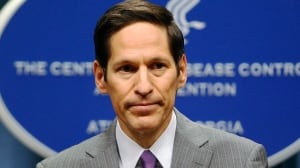 |
| Centers for Disease Control and Prevention (CDC) Director, Dr. Thomas Frieden, announced new recommendations for voluntary home quarantine for people at the highest risk of Ebola infection. Tami Chappell/Reuters |
Dr. Thomas Frieden, director of the U.S. Centers for Disease Control and Prevention (CDC), said high risk individuals would include healthcare workers who suffer a needle stick while caring for an Ebola patient or who tend to a patient without protective gear.
Those high-risk individuals would be asked to not use public transit or frequent public places during a 21-day period. It is recommended that they have their temperature taken daily and be monitored for symptom development.
Frieden said he took those measures after his trip to West Africa. His 21-day period has already ended.
Under the new guidelines that spell out four risk categories, most health-care workers returning from West Africa's Ebola hot zone would be considered to at "some risk" for infection, while health-care workers tending to Ebola patients at U.S. facilities would be seen as "low but non-zero" risk.
The lowest risk category would be anyone who did not travel to an affected country or travelled more than 21 days ago.
"I wish we could get to zero risk in the U.S.," said Frieden, adding that can only come about by stopping Ebola at its source.
Mandatory quarantines questioned
Some states have implemented mandatory 21-day quarantines. In New Jersey, New York, Illinois and Maryland, health-care workers who had contact with Ebola patients and are returning from West Africa are required to submit to the quarantine whether they show symptoms of Ebola or not.
New York has more travellers returning from affected West African countries than any other state, said Frieden. Maryland has the second most.
Frieden said the CDC worked closely with Doctors without Borders when developing the new guidelines.
On Monday, Doctors Without Borders released a statement saying the organization prefers "diligent health monitoring" of anyone returning form Ebola affected countries rather than mandatory quarantine.
"There are other ways to adequately address both public anxiety and health imperatives, and the response to Ebola must not be guided primarily by panic in countries not overly affected by the epidemic," said Sophie Delaunay, the executive director of the organization's U.S. chapter.
"Any regulation not based on scientific medical grounds, which would isolate healthy aid workers, will very likely serve as a disincentive to others to combat the epidemic at its source, in West Africa."
Ontario Health Minister Eric Hoskins said mandatory quarantines are not "good science," adding that he disagrees with New Jersey and New York's measures.
Thomson Reuters
No comments:
Post a Comment